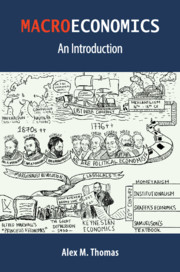Book contents
- Frontmatter
- Dedication
- Contents
- List of Illustrations
- List of Figures
- List of Tables
- Preface
- Acknowledgements
- Note to the Reader
- 1 What is Economics
- 2 Conceptualising the Macroeconomy
- 3 Money and Interest Rates
- 4 Output and Employment Levels
- 5 Economic Growth
- 6 Why Economic Theory Matters
- 7 The Policy Objective of Full Employment
- 8 The Policy Objective of Low Inflation
- 9 Towards Good Economics
- Data Sources
- References
- Index
1 - What is Economics
Published online by Cambridge University Press: 08 June 2021
- Frontmatter
- Dedication
- Contents
- List of Illustrations
- List of Figures
- List of Tables
- Preface
- Acknowledgements
- Note to the Reader
- 1 What is Economics
- 2 Conceptualising the Macroeconomy
- 3 Money and Interest Rates
- 4 Output and Employment Levels
- 5 Economic Growth
- 6 Why Economic Theory Matters
- 7 The Policy Objective of Full Employment
- 8 The Policy Objective of Low Inflation
- 9 Towards Good Economics
- Data Sources
- References
- Index
Summary
Introduction
A cursory glance at your daily newspaper for an entire week might tell you about: how the Indian farmers are struggling, how the manufacturing sector is not creating enough jobs, the nature of India's economic growth, the changes made by the Reserve Bank of India (RBI) to the interest rates, the stubbornly wide socioeconomic inequalities across caste and gender, how growth in manufacturing is causing ecological damage, and/or how the Bombay Stock Exchange (BSE) reacted with cheer to a recent government notification. All these listed issues are economic in nature because they deal with employment, economic growth, interest rates and economic inequalities, and they affect the livelihood of individuals, entire communities, sectors as well as the nation. But why spend time trying to understand these economic issues? Of course, if you are enrolled for a bachelor's or master's course in economics, you are required to study them. To pose the earlier question slightly differently, what is it that motivates you to enroll for an economics course or to spend time studying them independently?
To an economist, all the above-mentioned issues will appear related. Although Indian farmers are struggling, they are unable to find jobs in the manufacturing sector because it has not been creating adequate jobs and because the farmers do not have access to the skills/education that are required in the manufacturing sector. India's economic growth is mainly driven by the growth of the services sector; here too, not many jobs are being created and nor do the Indian farmers have the requisite skills/education. The fact of unequal access to education is explained mostly by the historical inequalities arising from the ownership of land and capital. Since agricultural output is insufficient (due to which the farmers’ livelihoods are adversely affected), agricultural prices rise. To tackle this price rise (or inflation), the RBI decides to increase the rate of interest to mop up excess money (more accurately, liquidity) from the economy; this is done because it believes that inflation is caused by too much money chasing too few goods.
- Type
- Chapter
- Information
- MacroeconomicsAn Introduction, pp. 1 - 19Publisher: Cambridge University PressPrint publication year: 2021



